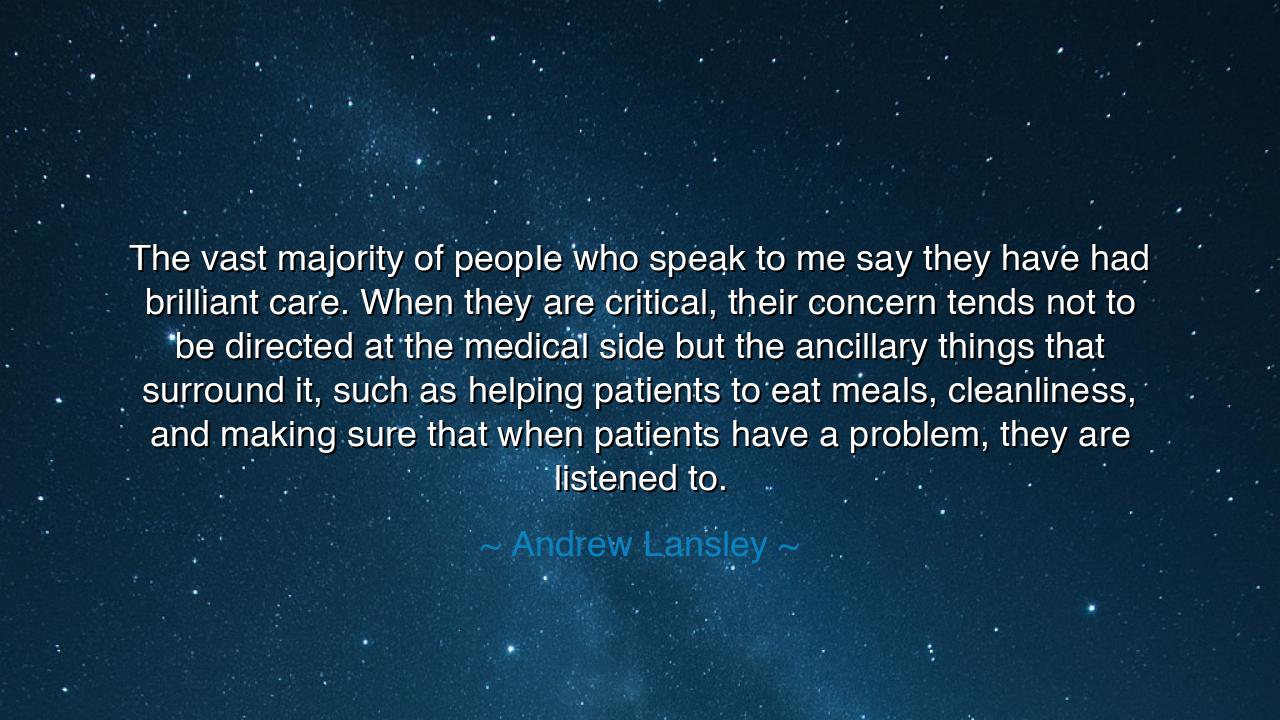
The vast majority of people who speak to me say they have had
The vast majority of people who speak to me say they have had brilliant care. When they are critical, their concern tends not to be directed at the medical side but the ancillary things that surround it, such as helping patients to eat meals, cleanliness, and making sure that when patients have a problem, they are listened to.






"The vast majority of people who speak to me say they have had brilliant care. When they are critical, their concern tends not to be directed at the medical side but the ancillary things that surround it, such as helping patients to eat meals, cleanliness, and making sure that when patients have a problem, they are listened to." With these words, Andrew Lansley brings forth an essential truth about the nature of care—a truth that transcends the realm of just medicine and touches the very soul of human interaction. While the technical aspects of medical treatment are crucial, the human elements—the compassion, attention, and respect we offer one another—are equally, if not more, significant in the experience of care.
In the ancient world, the most revered healers were not only skilled in the science of medicine, but also in the art of empathy and listening. Hippocrates, the father of modern medicine, understood that to be truly effective, a healer must care for the whole person, not just the body. In his famous oath, he vowed not only to treat the patient but also to listen to their concerns, to offer comfort, and to make them feel heard and understood. The ancient Greeks understood that care was not a transaction of treatment, but a shared journey toward healing, and that the experience of being cared for was just as important as the medical intervention itself.
Similarly, the great Roman physicians such as Galen also understood that the body and the soul must be treated as one. For Galen, healing was not simply about curing disease but about creating a harmonious balance between the physical and emotional well-being of the patient. He believed that one could not heal the body without first addressing the spirit. His teachings emphasized that the ancillary aspects of care—such as comfort, compassion, and attention to the individual’s needs—were vital to the healing process. In this, we see the roots of Lansley’s observation that care extends beyond just the medical treatment and into the realm of human connection.
The experience Lansley describes—where patients, despite receiving brilliant care medically, still feel neglected due to a lack of attention to the ancillary aspects—is not a modern phenomenon, but an age-old challenge. In many ancient cultures, care was as much about the soul as it was about the body. The Egyptians, for instance, in their healing temples, emphasized the importance of providing a calm and supportive environment for patients. Beyond the physical remedies, patients were also offered rest, comfort, and a sense of safety and dignity. The environment in which care was provided was viewed as integral to the healing process, not separate from it.
This understanding resonates deeply in Lansley’s quote, where the focus is on the ancillary needs—the human touch that makes care not just effective but also compassionate. In our world today, where healthcare has become highly specialized, it is easy to overlook these seemingly small aspects of care. Yet, patients speak not just of medical outcomes but of how they were made to feel in the process—whether they were heard, whether they felt their dignity was respected, whether their needs for comfort and cleanliness were met. These elements, which may seem secondary, are in fact foundational to the overall experience of care.
We can draw from the story of Florence Nightingale, the founder of modern nursing, who revolutionized healthcare during the Crimean War. Nightingale’s impact went far beyond the technical aspects of medical care. She understood that the environment—cleanliness, comfort, and the attentiveness of caregivers—was critical to healing. Her meticulous attention to the sanitation of the hospital wards and the mental well-being of the soldiers transformed nursing into a profession centered not only on the treatment of the body but on the care of the whole person. Her philosophy mirrors Lansley’s insight that true care involves more than just the direct medical intervention; it involves creating an environment where people feel valued, respected, and heard.
The lesson from Lansley’s reflection is clear: care is about more than just providing the right treatments—it is about providing a holistic experience for the patient. This means paying attention to the small details—the comfort of the patient, the cleanliness of their surroundings, the importance of listening, and offering them a sense of dignity in their most vulnerable moments. True compassionate care must encompass the entire person, body and soul, and acknowledge that the way we are treated emotionally and socially can be just as important as the treatments we receive medically.
In our own lives, let us adopt this principle in all our dealings with others. Whether we are caregivers, parents, friends, or strangers, let us remember that compassion and attention to detail—listening to the concerns of others, respecting their dignity, and ensuring their comfort—are at the heart of what makes us truly human. Let us be mindful that the smallest acts of care—the way we listen, the way we offer our help—can have the greatest impact, far beyond the more visible acts of service. By embodying the wisdom of Lansley’s words, we can create an environment where respect, compassion, and understanding flourish, and where true healing takes place.






AAdministratorAdministrator
Welcome, honored guests. Please leave a comment, we will respond soon